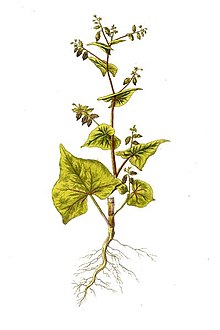Tartary buckwheat
| Tartar buckwheat | |
|---|---|
 |
|
| Scientific classification | |
| Kingdom: | Plantae |
| (unranked): | Angiosperms |
| (unranked): | Eudicots |
| (unranked): | Core eudicots |
| Order: | Caryophyllales |
| Family: | Polygonaceae |
| Genus: | Fagopyrum |
| Species: | F. tataricum |
| Binomial name | |
|
Fagopyrum tataricum (L.) Gaertn. |
|
| Synonyms | |
|
|
Fagopyrum tataricum, also known as Tartary buckwheat,green buckwheat,ku qiao, or bitter buckwheat, is a domesticated food plant in the genus Fagopyrum in the family Polygonaceae. With another species in the same genus, common buckwheat, it is often counted as a cereal, but unlike the true cereals the buckwheats are not members of the grass family. Thus they are not related to true wheat. Tartary buckwheat is more bitter, but contains more rutin than common buckwheat. It also contains quercitrin. Rutin and quercitrin have been proven effective in detoxification, especially in prevention of liver damage or liver inflammatory injury.
Tartar buckwheat was domesticated in east Asia, and is also cultivated in Europe and North America. While it is an unfamiliar food in the West, it is common in the Himalayan region today, as well as other regions in Southwest China such as Sichuan province.
The plant has been cultivated in many parts of the world though when found among other crops it is considered a weed.
Fagopyrum tataricum contains aromatic substances. The most important difference when compared to the aroma of Fagopyrum esculentum is the absence of salicylaldehyde and presence of naphthalene.
Tartary buckwheat is a healthy and nutritionally important food item. Study suggests that it exerts hepatoprotection via promoting anti-oxidative and anti-inflammatory properties against oxidative liver damage.
Tartary buckwheat is used to alleviate diabetes mellitus, hypertension, hypercholesterolemia, and gallstones. Animal experimental studies support the view that buckwheat protein could have beneficial effects for various diseases, including hyperlipemia, and that buckwheat leaf may have antioxidative properties.
...
Wikipedia
